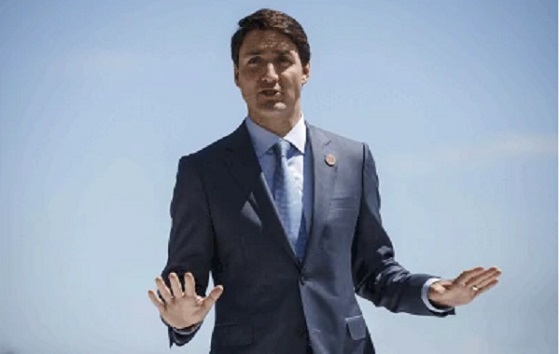Media
Trudeau’s Digital Services Tax threatens taxpayers and the economy

From the Canadian Taxpayers Federation
Author: Jay Goldberg
In other words, Trudeau is imposing a multi-billion-dollar tax on taxpayers – at a time when 50 per cent of Canadians say they’re $200 away from not being able to pay their bills.
Prime Minister Justin Trudeau managed to do two terrible things in one fell swoop: raise costs for Canadians at a time they can least afford it and risk a trade war with the United States.
The Trudeau government pushed its new Digital Services Tax through Parliament before quitting for the summer.
The government’s DST targets large foreign companies operating online marketplaces and social media platforms earning revenue from online advertising, such as Amazon, Facebook, Google and Airbnb. It is a three per cent tax on all revenue these companies generate in Canada.
Two red flags should pop up immediately for taxpayers. First, these companies won’t just eat the tax without passing costs onto consumers. And second, the United States government is sure to retaliate.
On the first point, there were clear signs that prices for Canadian consumers would increase because of this tax long before it was passed into law.
When the DST was in its proposal stage, the Parliamentary Budget Officer did an estimate of how much the government’s new tax would cost Canadians.
The PBO estimated the government’s DST would lead to an additional $7.2 billion in federal tax revenue over the next five years.
Where is that money coming from?
While major foreign companies will be the ones paying the tax directly, Canadian consumers will be hit with the bill.
It is “expected that businesses in the targeted sectors will adjust their services and prices in response to the new law,” the PBO said.
In other words, Trudeau is imposing a multi-billion-dollar tax on taxpayers – at a time when 50 per cent of Canadians say they’re $200 away from not being able to pay their bills.
Not only is Trudeau’s new DST going to increase costs for consumers, Canada also risks a trade war with the United States over the tax, which would cost Canadians even more.
In the wake of Trudeau’s DST getting through Parliament, the United States Trade Representative warned the U.S. will “do what’s necessary” to respond to the Trudeau’s new tax. USTR Katharine Tai warns she will look at “all available tools” as part of the U.S. response.
Tai’s isn’t the only voice in the U.S. calling for retaliatory action.
The Computer and Communications Industry Association, which represents tech companies like Amazon, Apple and Uber that will be targeted by Trudeau’s new tax, is calling on the Biden administration to fight back.
“With Canada’s DST now law, the time has come to announce [retaliatory] action,” said the association’s vice president, Jonathan McHale.
The president and CEO of the Tax Foundation is warning that U.S. retaliation would likely come through hiking tariffs on imports from Canada.
Given that the U.S. is by far Canada’s largest trading partner, making it more expensive to get Canadian goods into the American marketplace could have a detrimental impact on Canada’s economy, costing us both economic growth and jobs.
More than two years ago, the USTR warned against the Trudeau government taking measures that “single out American firms for taxation while effectively excluding national firms engaged in similar lines of business.”
But Trudeau chose to ignore those warnings and do exactly that.
To add insult to injury, the law authorizing the Trudeau government to bring the DST into effect (whenever it so chooses) allows it to do so retroactively, all the way back to 2022. Companies could be on the hook for huge sums for tax years in which the law didn’t even exist.
No wonder the Americans are threatening to fight back.
The bottom line is that Trudeau has put Canada in a terrible position. He is risking higher prices for Canadians and tariffs on our exports to the U.S. market, all in a lust for more cash. And the revenue the government is likely to bring in through the DST, an average of $1.4 billion a year, would be spent by this government in just one day.
It’s not too late for Trudeau to back down. Cabinet could choose not to bring the tax into force and avoid retaliation from the US.
For the good of taxpayers and the Canadian economy, Trudeau must abandon the DST.
Artificial Intelligence
Google denies scanning users’ email and attachments with its AI software

From LifeSiteNews
Google claims that multiple media reports are misleading and that nothing has changed with its service.
Tech giant Google is claiming that reports earlier this week released by multiple major media outlets are false and that it is not using emails and attachments to emails for its new Gemini AI software.
Fox News, Breitbart, and other outlets published stories this week instructing readers on how to “stop Google AI from scanning your Gmail.”
“Google shared a new update on Nov. 5, confirming that Gemini Deep Research can now use context from your Gmail, Drive and Chat,” Fox reported. “This allows the AI to pull information from your messages, attachments and stored files to support your research.”
Breitbart likewise said that “Google has quietly started accessing Gmail users’ private emails and attachments to train its AI models, requiring manual opt-out to avoid participation.”
Breitbart pointed to a press release issued by Malwarebytes that said the company made the changed without users knowing.
After the backlash, Google issued a response.
“These reports are misleading – we have not changed anyone’s settings. Gmail Smart Features have existed for many years, and we do not use your Gmail content for training our Gemini AI model. Lastly, we are always transparent and clear if we make changes to our terms of service and policies,” a company spokesman told ZDNET reporter Lance Whitney.
Malwarebytes has since updated its blog post to now say they “contributed to a perfect storm of misunderstanding” in their initial reporting, adding that their claim “doesn’t appear to be” true.
But the blog has also admitted that Google “does scan email content to power its own ‘smart features,’ such as spam filtering, categorization, and writing suggestions. But this is part of how Gmail normally works and isn’t the same as training Google’s generative AI models.”
Google’s explanation will likely not satisfy users who have long been concerned with Big Tech’s surveillance capabilities and its ongoing relationship with intelligence agencies.
“I think the most alarming thing that we saw was the regular organized stream of communication between the FBI, the Department of Homeland Security, and the largest tech companies in the country,” journalist Matt Taibbi told the U.S. Congress in December 2023 during a hearing focused on how Twitter was working hand in glove with the agency to censor users and feed the government information.
If you use Google and would like to turn off your “smart features,” click here to visit the Malwarebytes blog to be guided through the process with images. Otherwise, you can follow these five steps courtesy of Unilad Tech.
- Open Gmail on Desktop and press the cog icon in the top right to open the settings
- Select the ‘Smart Features’ setting in the ‘General’ section
- Turn off the ‘Turn on smart features in Gmail, Chat, and Meet’
- Find the Google Workplace smart features section and opt to manage the smart feature settings
- Switch off ‘Smart features in Google Workspace’ and ‘Smart features in other Google products’
On November 11, a class action lawsuit was filed against Google in the U.S. District Court for the Northern District of California. The case alleges that Google violated the state’s Invasion of Privacy Act by discreetly activating Gemini AI to scan Gmail, Google Chat, and Google Meet messages in October 2025 without notifying users or seeking their consent.
Censorship Industrial Complex
UK Government “Resist” Program Monitors Citizens’ Online Posts

-

 Alberta9 hours ago
Alberta9 hours agoFrom Underdog to Top Broodmare
-

 Energy1 day ago
Energy1 day agoPoilievre says West Coast Pipeline MOU is no guarantee
-

 Energy1 day ago
Energy1 day agoWill the New West Coast Pipeline MoU Lead to Results? Almost Certainly Not According to AI
-

 Alberta1 day ago
Alberta1 day agoWest Coast Pipeline MOU: A good first step, but project dead on arrival without Eby’s assent
-

 Carbon Tax1 day ago
Carbon Tax1 day agoCanadian energy policies undermine a century of North American integration
-

 Alberta1 day ago
Alberta1 day agoCarney forces Alberta to pay a steep price for the West Coast Pipeline MOU
-

 Alberta1 day ago
Alberta1 day agoAlberta and Ottawa ink landmark energy agreement
-

 Energy21 hours ago
Energy21 hours agoOttawa and Alberta’s “MOU” a step in the right direction—but energy sector still faces high costs and weakened competitiveness


